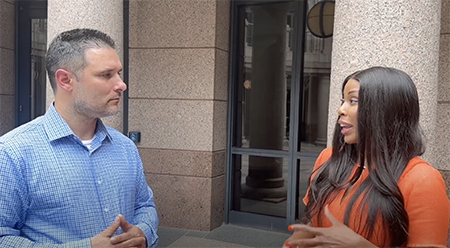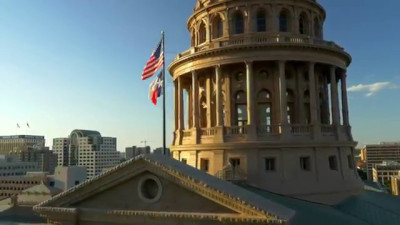Texas Ethics Commission Agrees with Pro-Life Leader and Votes to Close "Dangerous Loophole" in Elections
 The following story originally appeared on The Quorum Report.
The following story originally appeared on The Quorum Report.
Setting things up for what could very well be another throwdown in the Legislature next year over so-called “dark money” in elections, the Texas Ethics Commission on Wednesday voted to adopt a rule that requires certain nonprofits to disclose their donors when they play in politics. Under the rule, groups would have to disclose donors if they spend 25 percent or more of their annual budget on political expenditures.
The commission has already sought to clarify that dark money groups can spend up to 20 percent of their revenue on political expenditures without disclosing the names of donors. That would be a “safe harbor,” so to speak.
At the beginning of Wednesday’s hearing on the issue, Commissioner Chase Untermeyer said critics of the agency have been way off base to suggest that they’re somehow overstepping their authority. “That is not the case,” he said. Untermeyer said he invites lawmakers to examine dark money in the 2015 session “if it is the will of The Legislature." The way the process played out on Senate Bill 346 last session – that was the dark money bill carried by Sen. Kel Seliger, R-Amarillo – should have no bearing on what the commission is working on now, Untermeyer said. That process ended with Gov. Perry’s veto.
"That is a matter of history and it is not relevant to our deliberations," Untermeyer said. Now that the dust has settled on that fight, “we are left with our sworn duty which is to enforce the law as is currently written,” he said. Untermeyer added, however, that the law is “vague” and further guidance from lawmakers would be appropriate.
During the hearing, TEC Chairman Jim Clancy pointed out that the failure of SB 346 did not change the fact that the Texas Government Code requires the commission to work to "disclose fully information related to expenditures and contributions for elections and for petitioning the government.”
None of the Texas Senate nominees who previously warned the commission that the agency was overstepping its authority accepted Clancy’s invitation to testify about it. At least one of them, Bob Hall, was down the hall in the Texas Capitol during the commission’s meeting, by the way. A spokesman for Hall said his opinion was made clear in his original letter.
Joe Nixon, an attorney for Midland oilman Tim Dunn’s Empower Texans and that group’s spokesman Michael Quinn Sullivan, said that the rule is "subject to great ambiguity." The 25% threshold for disclosing donors will undoubtedly lead to lawsuits against the agency, Nixon told commissioners. "Everything the commission does has to be done with respect to the First Amendment.”
But pro-life leader Joe Pojman, longtime executive director of Texas Alliance for Life, said there is nothing about the rule that stifles the First Amendment. "It does not in any way limit political speech," Pojman said and “it merely requires disclosure of donations that are more than 25 percent of income.”
Pojman said the rule would “increase the accountability” in Texas elections by closing what he called a “dangerous loophole” that allows unlimited amounts to be raised and spent while keeping the public in the dark about what’s happening. "We can't accomplish what we want here in our legislative activity unless there's a clean process," Pojman said.
Commissioner Untermeyer asked Pojman about whether members of his group are concerned about their names being disclosed, especially given the fact that abortion is one of the most emotionally charged and polarizing political issues. “That may be a deterrent to some people,” Pojman said. However, Pojman said he has never received a complaint to that effect from any of the members of his group.
David Keating with the Center for Competitive Politics told commissioners "you have to wrestle with that" as far as the vagueness in the law. Keating’s group, which regularly sues over similar regulations and laws in states around the country, thinks the rule adopted Wednesday is “highly vulnerable in court.” In an ironic moment, Keating was asked how his group finances its activities and his response was "we don't disclose the names of our individual donors.”
Longtime lobbyist Steve Bresnen, who researched the sworn complaints against Empower Texans and Sullivan, said the rule isn’t perfect but the agency needs to move forward because “they want to operate secretly. They want to own this legislature and this executive branch and they want to do it without anybody knowing where the money comes from.”
Commissioner Paul Hobby said the fact that the agency is now taking fire from all sides about this rule means "we're probably making pretty good policy.” Hobby said he understands there are some people who think the commission is trying to overturn the governor’s veto of SB 346, but that’s not at all what they are doing. "We are not dreaming up things to make policy about," he said.
Hobby said the reality is that people in the regulated community are asking the commission to offer guidance. Hobby found it somewhat puzzling that the Texas Homeschool Coalition is suing commissioners over this because the THSC spends 9 percent of its annual budget on politics and therefore would not be subject this rule.
Copyright October 29, 2014, Harvey Kronberg, www.quorumreport.com, All rights are reserved. Reprinted with permission.








Comments
Join the discussion on Facebook
Join the discussion on Facebook.